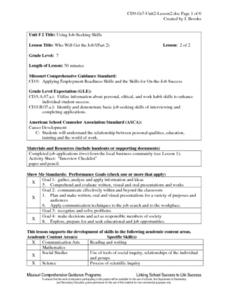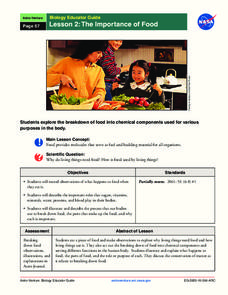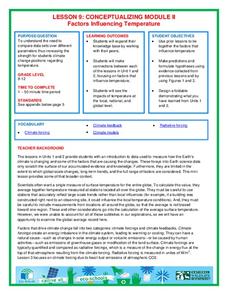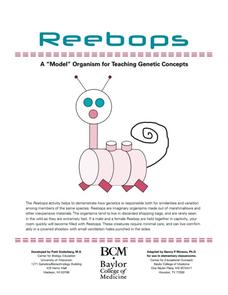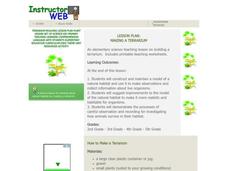Curated OER
Who Will Get the Job?
Seventh graders demonstrate their ability to identify interview skills that lead to success in the job-seeking process by participating in and observing an interview with an employer. Students also use a checklist to validate their...
Captain Planet Foundation
Worm Your Way Out of This
How can you provide healthy soil for your garden? Study worms, bacteria, and other microorganisms in a lesson about decomposition and organic compost. After discussing what you know about worms and watching a video, watch what worms do...
NASA
The Importance of Food
Pupils make observations while eating food. They act out the process of food breaking down in the body and the roles of various chemical components, such as sugar and protein. It concludes with an activity illustrating the process and a...
Captain Planet Foundation
Sense of Place
Explore the five senses with a kindergarten lesson on gardening. After taking a walk through the class garden, kids note what they see, hear, feel, taste, and smell, and then decide what is living in the garden versus what is not living....
Curated OER
Food for Spaceflight
When astronauts get hungry in outer space, they can't just call and have a pizza delivered. In order to gain an appreciation for the challenges associated with space travel, young learners are given the task of selecting, testing, and...
Kenan Fellows
Sustainability: Learning for a Lifetime – Soil
Do great gardeners really have green thumbs—or just really great soil? Environmental scholars discover what makes Earth's soil and soil quality so important through research and experimentation. Learners also develop an understanding of...
DiscoverE
Water Pollution Cleanup
How do scientists determine the best method for removing pollutants from our water sources? Environmental scholars experiment with pollution clean-up options to discover which are the most cost-effective, fastest, and most thorough....
Intel
Forensics: Get a Clue
Although the methods are all scientific, forensic science was started by police officers rather than scientists, who relied on observation and common sense. Young detectives use many tools to solve crimes around the school in a...
Baylor College
Moving Air
In lab groups, young scientists place aluminum cans with a bubble-solution cap into different temperatures of water to see what size of bubble dome forms. As part of an atmosphere unit in preparation for learning about convection...
Consortium for Ocean Science Exploration and Engagement (COSEE)
Ocean Acidification: Whats and Hows
Open this activity by demonstrating the production of acidic carbon dioxide gas by activated yeast. Emerging ecologists then experiment with seashells to discover the effect of ocean acidification on shelled marine organisms. They...
National Wildlife Federation
When It Rains It Pours More Drought and More Heavy Rainfall
Which is worse — drought or flooding? Neither is helpful to the environment, and both are increasing due to climate change. The 16th instructional activity in a series of 21 covers the average precipitation trends for two different...
National Wildlife Federation
Conceptualizing Module II - Putting It All Together
"Creativity is just connecting things." - Steve Jobs. After weeks of researching climate change, the ninth lesson in a series of 21 combines the data and analysis to address essential questions. It covers natural phenomenon, human...
Columbus City Schools
Get Your Organisms Organized
From large to small, show your class how to organize them all! Included within the guide is everything you need to take their knowledge of classification from the cellular to the species level. The worksheets focus on building vocabulary...
Rochester Institute of Technology
Heat Transfer
Use an exciting role play activity to teach young chemists about the importance of heat transfer in maintaining homeostasis. They assume the role of a dog sled owner who has been abandoned and must fend for themselves with only a few...
Baylor College
Reebops: A “Model” Organism for Teaching Genetic Concepts
In a sweet simulation, junior geneticists examine the chromosomes of a fictitious Reebop marshmallow animal, combine chromosomes to produce offspring, and then make a model of the resulting Reebop baby. Phenotypes include number of...
Curated OER
Observation
Students study the different kinds of observation: fact and opinion. For this observation lesson students complete an activity that allows them to use their senses to make observations.
Curated OER
Making a Terrarium
Students construct and maintain model of natural habitat, suggest improvements to the model of the natural habitat to make it more realistic and habitable, and demonstrate careful observation and recording of how animals survive in their...
Curated OER
Applied Science - Physics Pre-Lab
Students observe fluid motion. In this Physics lesson, students explore the principles of Pascal, Archimedes, and Bernoulli. Students list their experiences with fluid movement.
Curated OER
Inquiry in Science Using an Animal Behavior Model
Students observe a planaria without a microscope and with a stereoscopic microscope. They draw the planaria and describe its motion and eating habits. Students research planarias various body systems and behavior. They design an...
Curated OER
For Safety's Sake: Introduction to Laboratory Safety in Science
Young scholars practice safety in and out of the science laboratory. In this science lesson plan, students consider a list of safety precautions and guidelines as they apply to the science laboratory and associate the correct laboratory...
Virginia Department of Education
Weather Patterns and Seasonal Changes
Get your class outside to observe their surroundings with a lesson plan highlighting weather patterns and seasonal changes. First, learners take a weather walk to survey how the weather affects animals, people, plants, and trees during...
Berkshire Museum
Adopt a Schoolyard Tree
Help young scientists connect with nature and learn about trees with a fun life science lesson. Heading out into the school yard, children choose a tree to adopt, taking measurements, writing descriptions, and drawing sketches of it in...
Howard Hughes Medical Institute
Gorongosa: Scientific Inquiry and Data Analysis
How does the scientific process begin? Introduce ecology scholars to scientific inquiry through an insightful, data-driven lesson. Partners examine data from an ongoing research study to determine the questions it answers. The resource...
Curated OER
In Touch with Apples
Students read "How To Make an Apple Pie and See the World", the story of a girl who traveled the world to find the ingredients to make her apple pie. They conduct a series of interdisciplinary activities including testing their senses,...


